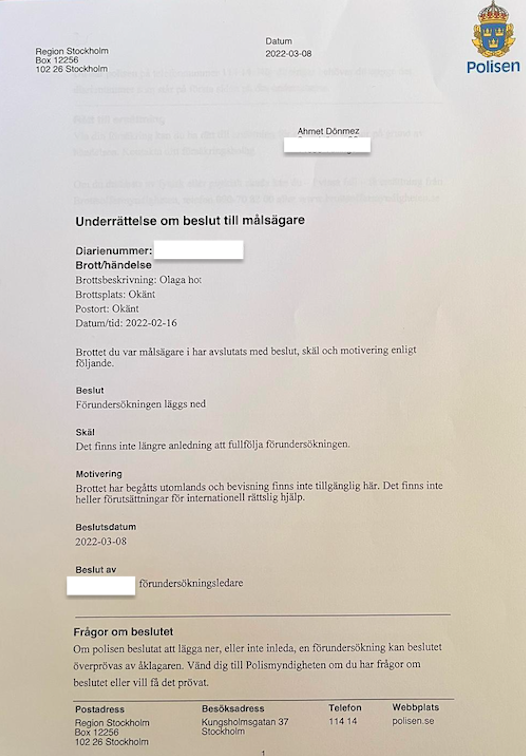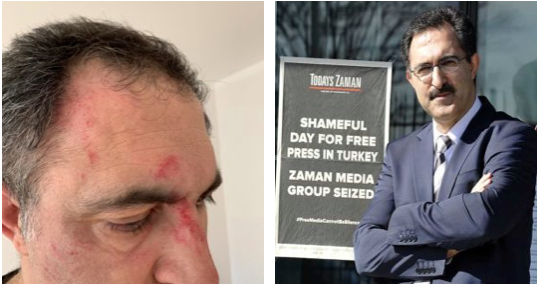Nordic Monitor/Stockholm
Turkish journalist Ahmet Dönmez, a critic of the Turkish government who is living in exile in Sweden, was attacked by what are believed to be two assailants near his home in Stockholm on Friday.
Dönmez, who was seriously injured in the attack, suffering brain trauma, is still under observation at the hospital. His family states that he is suffering from memory loss and cannot remember anything about the incident.
The assailants are believed to have crashed into Dönmez’s car from behind, making it look like a traffic accident, and attacked him when he got out, shortly after he picked up his 6-year-old daughter from school, Nordic Monitor has learned.
It seems that the attackers were monitoring Dönmez and had been following his daily routine for some time. They posted photos of Dönmez lying unconscious on the ground via anonymous and bot accounts with threatening messages on Twitter a few hours after the incident.
Dönmez had been writing about alleged ties between Turkish Interior Minister Süleyman Soylu and mafia groups. Soylu was the subject of allegations made by former partner and mafia leader Sedat Peker in 2021 that he had been running a state-sanctioned organized crime syndicate.

Dönmez published a number of YouTube videos on gun and drug lord Ayhan Bora Kaplan, who became the leader of one of Turkey’s biggest crime organizations by getting other rival mafia groups out of the way thanks to Minister Soylu.
In a February 19 tweet, Dönmez posted a WhatsApp threat from İhsan Hızarcı, a leading Ankara crime boss and close associate of Kaplan. Hızarcı told Dönmez he shouldn’t feel safe because he was in Sweden and that he would behead Dönmez within 24 hours.
Dönmez tweeted that “I identified Hızarcı’s men in Sweden and reported both the threat and the names to the relevant authorities.”
In the YouTube video he posted the following day, Dönmez explained in detail the threat he mentioned on Twitter. In addition to the Hızarcı’s henchmen, Dönmez also said he was called on behalf of the outlawed Turkish Workers and Peasants Liberation Army (TİKKO) and asked to remove the videos about Kaplan, but he could not confirm who the caller was. He also repeats in the video that he reported suspicious names to the Stockholm police and Swedish intelligence.
In response to a complaint made by Dönmez to the Stockholm Police regarding the threats the journalist had received, the police said an investigation was not possible:

Nordic Monitor has learned that the people acting as Hızarcı’s men in Sweden were known as Hıdır and Gökhan and that they were members of the mafia who had fled Turkey because of their crimes.
The Stockholm Police on March 8 replied to Dönmez, who reported on February 16 that he was receiving threats from a mafia group based in Turkey, that a preliminary investigation had been dropped on the grounds that the alleged crime was committed abroad and that the evidence was not available in Sweden, adding that conditions for international legal aid do not exist.
Dönmez was the Ankara correspondent for the once best-selling Zaman newspaper, which was closed down by the government of President Recep Tayyip Erdoğan in 2016. He had to leave Turkey shortly before the newspaper’s closure due to the risk of being imprisoned for books in which he described Erdoğan’s corruption schemes and illicit income from government tenders through businessmen close to him.
In a January 2021 article, Nordic Montior named Soylu as a suspected drug kingpin for his alleged involvement in the drug trade along with his partners in crime such as Gen. Arif Çetin, head of the gendarmerie, which controls borders and rural areas where drug trafficking routes are found.
Meanwhile, Stockholm has become known as an unsafe place for dissident Turkish journalists. In October 2020 another Swedish-based Turkish journalist and Nordic Monitor’s editor in-chief Abdullah Bozkurt was attacked by three men near his home in Stockholm. Bozkurt sustained injuries to the face, head, arms and legs from the vicious attack, which occurred in the middle of the day near a parking place next to his home in the Spånga suburb of Stockholm.

Bozkurt has been living in Sweden under political asylum protection since 2016, when the Turkish government launched an unprecedented crackdown on independent and critical media, jailing hundreds of journalists and media workers and shutting down nearly 200 media outlets.
Bozkurt had said he had regularly been receiving threats online, mostly from Turkey. In one case, Cem Küçük, a Turkish government propagandist, during a TV program openly called for Turkey’s National Intelligence Organization (MIT) to assassinate him. He said his home address in Stockholm was known by the Turkish authorities and demanded the “extermination” of the journalist.
Unlike other European countries, Sweden has been passing extradition requests from Turkey for critical Turkish journalists to its Justice Ministry, which reviews the cases. It is usually a lengthy legal procedure that unsettles the journalist and his/her family. It is presented as a success by the government as well as causing the journalist to be targeted by the pro-government media in Turkey.
“This is a concession to a government that has already destroyed media freedom,” says Levent Kenez, a journalist living in exile in Stockholm, for whom an extradition request from Turkey was recently denied, adding that “there are new Swedish-based Turkish journalists whose extradition requests are being reviewed, and that is not a good sign.”












